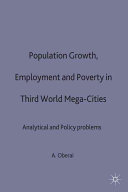
Population Growth, Employment and Poverty in Third-World Mega-Cities
By - Oberai, A. S. Oberai, A. S.
Floor
-
Floor 1
Published
-
St. Martin's Press, New York, N.Y., 1993
ISBN 10 - 0333594398
ISBN 13 - 9780333594391
Book Status
-
1 Qnty Available with us.
Shelf No
-
13
Call Number
-
304.60 OBE
Physical Description
-
xv, 224 pages ; 23 cm
Notes
-
Includes Index